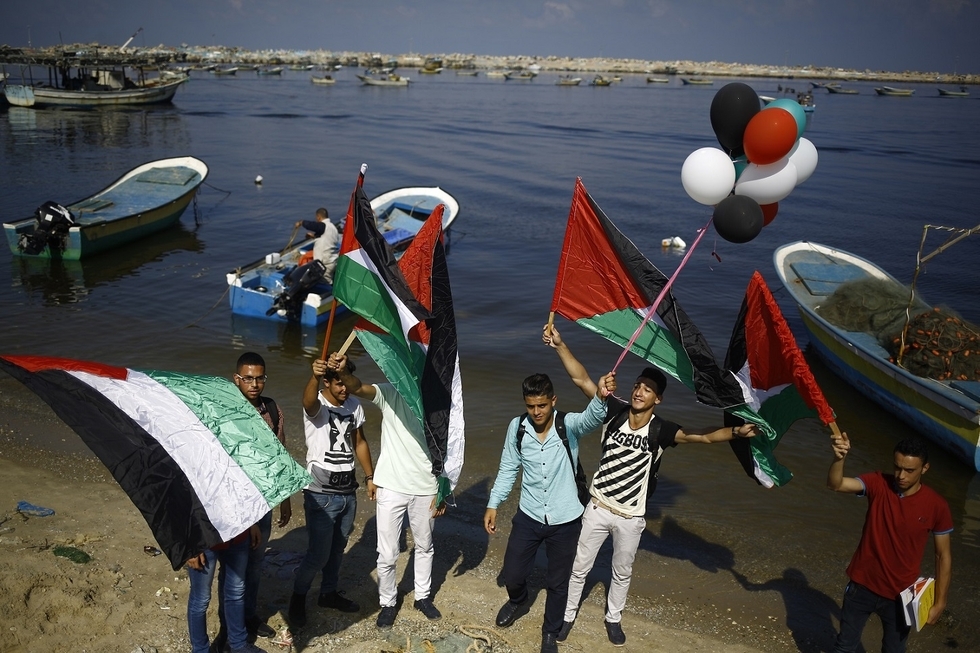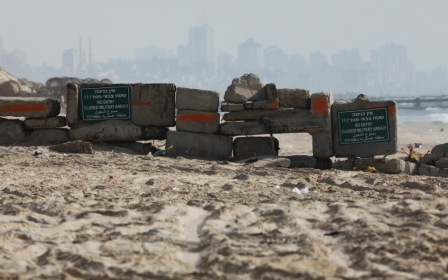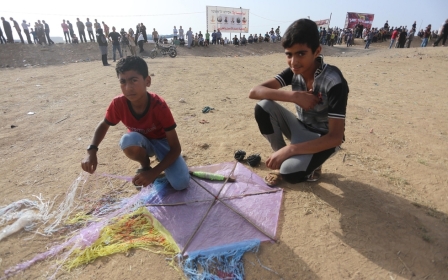'Gaza is fed up': Palestinians to send out boats defying siege

GAZA CITY - Palestinians in Gaza are planning to break the Israeli blockade of the enclave by sending out two boats carrying medical patients on Tuesday.
The move comes weeks after dozens of peaceful Palestinian protesters were fatally shot by Israeli forces in Gaza.
In late March, Palestinians launched the Great March of Return protest campaign to demand the right of return for refugees displaced in 1948 from their towns and villages in what is now Israel.
"I am here to register to travel to continue my therapy abroad. I'm demanding the right to receive my treatment abroad because of a lack of medicine and health services in Gaza," Mohammed Abu Eida, a Palestinian who was injured in the protests, told Middle East Eye.
For the past 11 years, Israel has imposed a siege on Gaza, severely restricting the flow of goods into the enclave, including food and medical supplies. Patients who require medical attention outside Gaza have been unable to leave the territory because of the blockade.
It’s time for the Israeli occupation to realise that Gaza is fed up with living without electricity, polluted water, high poverty rates, high unemployment rates and the loss of hope, and depression
- Salah Abd El Ati, activist
The initiative to send boats from Gaza, dubbed Al Hurriyeh (Liberty), coincides with the eighth anniversary of a deadly Israeli raid on a flotilla that attempted to bring supplies into Palestinian territory in 2010. Nine Turks were killed by Israeli soldiers who commandeered the boat. Israel apologised to Turkey in 2013.
Tuesday's boats will carry sick people, students and stranded travellers.
Abu Eida said the attempt to break the siege is a message to Israel and the US that Palestinians won't stay silent on the choking measures imposed on the Gaza Strip.
"Palestinians in Gaza will continue to protest by land and sea until their rights are upheld and demands met," he said.
More than 1.9 million Palestinians live under harsh humanitarian conditions in Gaza, where the unemployment rate is more than 43 percent. The Al Hurriyeh boats are set to depart Gaza as a flotilla from Denmark makes its way towards the strip to break the Israeli blockade.
In 2016, Israel detained and deported 13 activists who had set sail from Europe on the Women’s Boat to Gaza.
Activists say the blockade-breaking boats are part of the ongoing protest campaign that began at the end of March.
"Al Hurriyeh is part of the events of the Great March of Return," said Adham Abu Selmeyeh, a spokesman for the committee for breaking the siege.
"The boats will carry a group of patients, people with injuries, and others with humanitarian cases who need to leave Gaza as soon as possible."
Abu Selmeyeh added that organisers did not publicise the event ahead of time because Israeli forces had previously targeted two boats as they were being prepped for sail.
Organisers have not revealed the boats' first destination.
Salah Abd El Ati, a member of the Great March of Return committee, told MEE that protests will continue, adding that Al Hurriyeh boats are a message to the world that Palestinians have the right to live without restrictions.
"It’s time for the Israeli occupation to realise that Gaza is fed up with living without electricity, polluted water, high poverty rates, high unemployment rates and the loss of hope, and depression."
As Palestinians in Gaza announced their plans for the boats on Tuesday, the Israeli government said it was building a barrier off Zikim beach, a few kilometres north of Gaza - a step that would tighten the siege further.
Israel's defence ministry said it began construction of an underwater wall to prevent Palestinians from entering Israel by sea.
Boats in Gaza are limited to six nautical miles offshore; the Israeli naval forces regularly fire at Palestinian fishermen who sail within the permitted area.
This article is available in French on Middle East Eye French edition.
New MEE newsletter: Jerusalem Dispatch
Sign up to get the latest insights and analysis on Israel-Palestine, alongside Turkey Unpacked and other MEE newsletters
Middle East Eye delivers independent and unrivalled coverage and analysis of the Middle East, North Africa and beyond. To learn more about republishing this content and the associated fees, please fill out this form. More about MEE can be found here.




